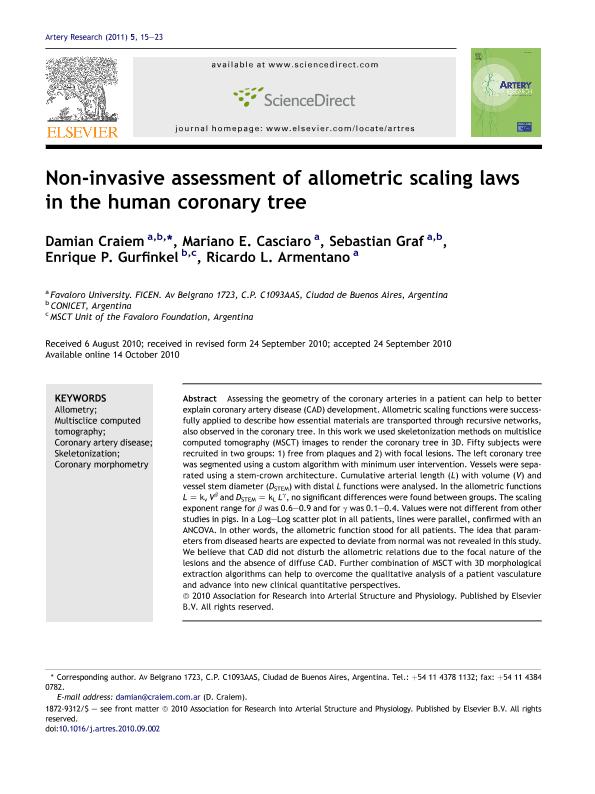Mostrar el registro sencillo del ítem
dc.contributor.author
Craiem, Damian

dc.contributor.author
Casciaro, Mariano Ezequiel

dc.contributor.author
Graf Caride, Diego Sebastián

dc.contributor.author
Gurfinkel, Enrique Pablo

dc.contributor.author
Armentano, Ricardo Luis

dc.date.available
2023-03-28T12:07:08Z
dc.date.issued
2011-03
dc.identifier.citation
Craiem, Damian; Casciaro, Mariano Ezequiel; Graf Caride, Diego Sebastián; Gurfinkel, Enrique Pablo; Armentano, Ricardo Luis; Non-invasive assessment of allometric scaling laws in the human coronary tree; Elsevier; Artery Research; 5; 1; 3-2011; 15-23
dc.identifier.issn
1872-9312
dc.identifier.uri
http://hdl.handle.net/11336/191783
dc.description.abstract
Assessing the geometry of the coronary arteries in a patient can help to better explain coronary artery disease (CAD) development. Allometric scaling functions were successfully applied to describe how essential materials are transported through recursive networks, also observed in the coronary tree. In this work we used skeletonization methods on multislice computed tomography (MSCT) images to render the coronary tree in 3D. Fifty subjects were recruited in two groups: 1) free from plaques and 2) with focal lesions. The left coronary tree was segmented using a custom algorithm with minimum user intervention. Vessels were separated using a stem-crown architecture. Cumulative arterial length (L) with volume (V) and vessel stem diameter (DSTEM) with distal L functions were analysed. In the allometric functions L = kv Vβ and DSTEM = kL Lγ, no significant differences were found between groups. The scaling exponent range for β was 0.6-0.9 and for γ was 0.1-0.4. Values were not different from other studies in pigs. In a Log-Log scatter plot in all patients, lines were parallel, confirmed with an ANCOVA. In other words, the allometric function stood for all patients. The idea that parameters from diseased hearts are expected to deviate from normal was not revealed in this study. We believe that CAD did not disturb the allometric relations due to the focal nature of the lesions and the absence of diffuse CAD. Further combination of MSCT with 3D morphological extraction algorithms can help to overcome the qualitative analysis of a patient vasculature and advance into new clinical quantitative perspectives.
dc.format
application/pdf
dc.language.iso
eng
dc.publisher
Elsevier

dc.rights
info:eu-repo/semantics/openAccess
dc.rights.uri
https://creativecommons.org/licenses/by-nc-sa/2.5/ar/
dc.subject
ALLOMETRY
dc.subject
CORONARY ARTERY DISEASE
dc.subject
CORONARY MORPHOMETRY
dc.subject
MULTISCLICE COMPUTED TOMOGRAPHY
dc.subject
SKELETONIZATION
dc.subject.classification
Ingeniería Médica

dc.subject.classification
Ingeniería Médica

dc.subject.classification
INGENIERÍAS Y TECNOLOGÍAS

dc.title
Non-invasive assessment of allometric scaling laws in the human coronary tree
dc.type
info:eu-repo/semantics/article
dc.type
info:ar-repo/semantics/artículo
dc.type
info:eu-repo/semantics/publishedVersion
dc.date.updated
2023-03-23T12:30:28Z
dc.journal.volume
5
dc.journal.number
1
dc.journal.pagination
15-23
dc.journal.pais
Países Bajos

dc.journal.ciudad
Amstedam
dc.description.fil
Fil: Craiem, Damian. Universidad Favaloro. Facultad de Ingeniería y Ciencias Exactas y Naturales. Departamento de Tecnología Electrónica; Argentina. Consejo Nacional de Investigaciones Científicas y Técnicas; Argentina
dc.description.fil
Fil: Casciaro, Mariano Ezequiel. Universidad Favaloro. Facultad de Ingeniería y Ciencias Exactas y Naturales. Departamento de Tecnología Electrónica; Argentina. Consejo Nacional de Investigaciones Científicas y Técnicas; Argentina
dc.description.fil
Fil: Graf Caride, Diego Sebastián. Universidad Favaloro. Facultad de Ingeniería y Ciencias Exactas y Naturales. Departamento de Tecnología Electrónica; Argentina. Consejo Nacional de Investigaciones Científicas y Técnicas; Argentina
dc.description.fil
Fil: Gurfinkel, Enrique Pablo. Fundación Favaloro; Argentina
dc.description.fil
Fil: Armentano, Ricardo Luis. Universidad Favaloro. Facultad de Ingeniería y Ciencias Exactas y Naturales. Departamento de Tecnología Electrónica; Argentina
dc.journal.title
Artery Research
dc.relation.alternativeid
info:eu-repo/semantics/altIdentifier/url/https://www.sciencedirect.com/science/article/abs/pii/S1872931210000578
dc.relation.alternativeid
info:eu-repo/semantics/altIdentifier/doi/http://dx.doi.org/10.1016/j.artres.2010.09.002
Archivos asociados
